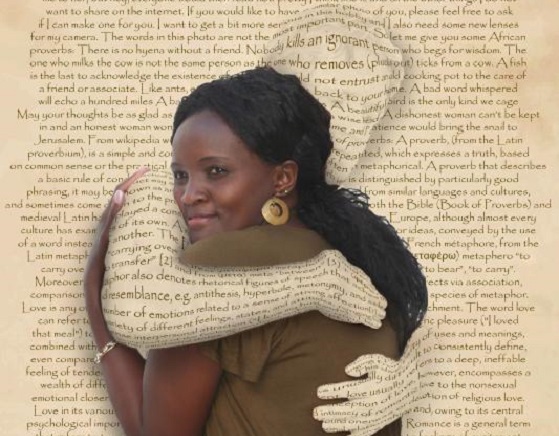What Lives Below Words: Improve Your Silence.

{source}
Sometimes my level of perception frightens me.
Recently, on a global webinar involving 40 people, I found myself monitoring the body language and mouthed lip conversation between two folks on opposite ends of my screen. How could anyone have been so acutely aware of 40 different people’s co-occurring experiences in these tiny boxes, all the while participating in the live session? I’ll tell you how.
Being an introvert, empath, seeker, and highly sensitive person means that safety is a top priority of mine — all forms of it: mental, emotional, physical and spiritual. In every environment, I am hyper-aware of who and what co-creates my surroundings to ensure optimum levels of okayness.
I have worked all my life to establish a balanced relationship with real versus imagined fears, given that operating as a refined threat-detector is not exactly conducive to health and happiness. While the subconscious motivation behind my laser-like perception is often fear-based, the gift of developing such a precise and intuitive radar is a supernatural skill.
Everything is amplified. I am constantly observing. Constantly anticipatory. Insatiably curious. Maybe it’s because I’m selective with my words, granting more space to witness. Maybe it’s because I require immense amounts of solitude, creating deeper sensory experiences with the outside world. Maybe it’s simply that humans perplex me, so I watch us to better understand.
Regardless, I approach every situation intentionally with an awareness around how I exist and coexist among the greater dynamic.
I see crowds of people as jigsaw puzzles. Or galaxies of star families who orbit around each other. My spending time in groups feels like that of a trance dance guardian. I am among a system of co-operating units. In ecstatic and trace dance sessions, participants are often blindfolded and spatially unaware of others, and it is here the non-blindfolded guardians keep a safe space for deep, sacred process.
Two people may blindly mirror each other across the room or right beside one another. On a cellular and vibrational level, attunement, resonance and communication dance in their own purity. Here, one’s presence and proximity is known beyond conscious realms. This is where the truth of our existence lives. Like the guardian, I too feel I am always managing the undercurrent of the unspoken world.
Recently, I attended a spiritual music conference entitled Music is the Medicine, held at The HART (Healing Arts Research Training) Center in Memphis, Tennessee. It was co-facilitated by the legendary musicians Steve Roach and Byron Metcalf, and the familial HART Center staff.
The experience involved exploring and receiving the transcendental and psychological benefits of binaural beats, electronic, ambient and metaphysical music forms, meditation, and shamanistic entrainment practices. It was immersive, holistically altering and certainly, beyond words.
As is true for any gathering, you’re likely to attract similar people. At this one, besides the expected musicians, creatives, and spiritualists, certainly an introverted nature threaded beneath the surface. I myself was unusually quiet throughout the entire conference. I will say, however, this seemingly involuntary silence deepened my energy-body’s experience tenfold.
Byron facilitated his meditation series, entitled The Shaman’s Heart, with three sequences, guiding us into soul-travel while lying on our backs. As each session concluded, the pervasive surround-sound heartbeat quieted and trailed off into the ether. The energetic, vibrational and emotional intensity of each set experience reverberated long after the music stopped.
And we sat in it. We swam in dense gravity, buzzing in awe like you’d do after a speaker-blaring concert, wondering what just happened. We happily bathed in the womb-like familiarity of this container. For minutes after each set, we sat in the depth of silence, of vibration, of our waved-and-particled existence. We did this for four days.
I will never forget this conference and my pivotal moment. We were sensorily reorienting to the space, waiting to transition into a group process about the experience. Steve guided us back into the vocal realm. He spoke kindly, softly, and slowly as a transitional tool. It wasn’t until that moment, being invited back into what he called the space of words, that I cognitively and physically brushed the boundary of different spaces.
The space of words. With those four words, Steve illuminated for me the existence of myriad other realms, known and unknown, how imperative they are for healing, and how scarcely we tend to them as we do words.
As a writer, aka a prioritizer of words, one simple semantic shift changed my entire psyche. Beyond myself, the space of words is a societally dominant, unconsciously abused default. In truth, however, it is like any other space we can monitor and consciously choose to enter.
I had never heard anyone articulate something so resonant with my introverted experience. Simply, I’m occupied by other spaces. A wordless space. The space of sound differs from that of frequency, vibration, light, words, noise, etc. The depths are vast and varied.
What would it be like to acclimate to our internal nuances? The subtle nooks and crannies of the interior? What would it be like to hold more? To be with concepts, emotions, and experiences without naming them? To merely notice what you notice, as many mindfulness-based practitioners say.
There’s a reason why, in response to considering something, people say I need to sit with this more or Let me sleep on it. Both phrases suggest the magnitude of held and felt experience, with an inner knowing that true wisdom dwells in inarticulate spaces. Knowing this truth makes it easier to be more intentional about our use of words and cautious about their impact on space.
I’m reminded often of Gandhi’s famous quote, “Speak only if it improves upon the silence.” The same goes for sound. Be discerning about how to improve your silence (or if it, in fact, needs to be improved). For myself, in quiet spaces, I can’t listen to music with lyrics — only instrumentals — if and only if it betters my current experience.
Music, silence, words and every in-between realm are always there as resources to call on at our discretion.
Among silence lives worlds that long to be discovered. There are jewels resting in the limitlessness of these quiet spaces and everyone’s may feel different. Here lives a buffet of ever-changing colors, flavors, and textural experience. There is so much more to know above, below, beyond and in between words (spoken truly and sincerely by someone who’s in love with them).
An introvert knows the depths. And for folks who aren’t, certainly we all have a relationship to wordless spaces that inform the mosaic of our beingness.
When people think introversion is merely being shy or quiet, I try to withhold my laughter. When I moderate external stimulation, it feeds internal life. Quiet is where I go to hear my cells dance, where I can feel the colors of the internal landscape effervescing upward, downward, sideways.
There are worlds within, waiting for you to take your seat as guardian. To know your entire, multifaceted, multi-existent Self. To listen to your other modes of communication. To experience your simultaneous physical and non-physical parts. I have a feeling you won’t be sorry. Enjoy your quiet time. If you’re like me, that’s when it’s the loudest, and I wouldn’t have it any other way.
***
Paige Frisone is a body-based writing coach, writer and poet stationed in Boulder, Colorado. Originally from Chicago, her writing pursuits began at Butler University, finishing school at Naropa University with an integrated contemplative psychology focus. Her work has been featured in The Mighty, Elephant Journal, AboutBoulder, Rogue Agent, Entropy’s Enclave, and elsewhere. Learn more about her psychosomatic inquiries at her website.


